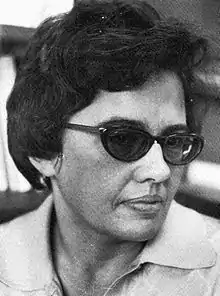Miyó Vestrini
Marie-Jose Fauvelle Ripert, best known as Miyó Vestrini (Nîmes, France 1938 – Caracas, Venezuela 1991) was a Venezuelan poet, journalist and scriptwriter.[1][2]
Miyó Vestrini | |
|---|---|
 | |
| Born | Marie-Jose Fauvelle Ripert April 27, 1938 Nîmes, France |
| Died | November 29, 1991 (aged 53) Caracas, Venezuela |
| Cause of death | Suicide |
| Nationality | Venezuelan |
| Occupation | Journalist, poet |
| Known for | Literary groups: El techo de la Ballena, Sardio, Apocalipsis, 40 grados a la sombra |
| Partner(s) | Pedro Llorens |
| Children |
|
Biography
When Vestrini was a young girl, she emigrated to Venezuela with her mother, beginning a “second childhood” in the Venezuelan Andes.[3] From an early age, she was dedicated to cultural journalism and took part in the groups, El Techo de la Ballena, Sardio, La República del Este in Caracas and Apocalipsis in Maracaibo. She was a press officer at the Venezuelan embassy in Italy and press chief of the Venezuelan Ministry of Foreign Affairs.[4] She anchored a radio program called Al pie de la letra. In Venezuela, she directed the art section of the newspaper El Nacional and Criticarte magazine. As a columnist, she took part in El Diario de Caracas, La República and El Universal. She also worked as a television screenwriter.[4] Her creations show a constant struggle between her French roots and the Latin American environment.[5]
Her poetry is intense and explosive. Her prose works stand out for being dense and moving around several levels of conflict. Her poetry and prose show the same wild character and a bold expression. Her writing embodies an ironic and direct level of language that expresses substantial cynicism. Enriquez Hernández said about her: “Miyó was a suicidal woman and that has to do with her poetry, because it is very disjointed, full of that world of protest, claim”.[6]
Work
Poetry
- Las historias de Giovanna (1971)
- El invierno próximo (1975)
- Pocas virtudes (1986)
- Todos los poemas (Posthumous. First edition, 1994. Second edition, 2013)
- Es una buena máquina (Posthumous, 2014)
- In Translation to English: Grenade in Mouth: Some Poems of Miyó Vestrini (Posthumous, 2019. Translated by Anne Boyer and Cassandra Gillig. Edited by Faride Mereb and Elisa Maggi.)[7]
Prose
- Órdenes al corazón (Posthumous, 2001)
- Biographies
- Más que la hija de un presidente: Sonia Pérez (1979)
- Isaac Chocrón frente al espejo (1980)
- Salvador Garmendia, pasillo de por medio (Póstumo, 1994)
Literary Interviews
- Al filo (2015).[1]
About her work
- Miyó Vestrini, el encierro del espejo (2002)
- Miyó Vestrini (2008)
- Estados del cuerpo y de la lengua: Los malestares de Miyó Vestrini (2008)
References
- Mereb, Faride (2015). Al filo (in Spanish). Letra Muerta. ISBN 9789801282297.
- "Miyó Vestrini, poeta del desamor y la muerte". Librería Barco De Papel (in Spanish). 2014-03-09. Retrieved 2017-09-25.
- Díaz, Mariela (2008). Una francesa en Betijoque: Miyó Vestrini. Biblioteca biográfica venezolana (in Spanish). El Nacional. ISBN 9789803952051.
- Miranda, Julio E (2001). Antología histórica de la poesía venezolana del siglo XX, 1907-1996 (in Spanish). La Editorial.
- Venezolana, Literatura (2011-07-23). "Literatura Venezolana: Miyó Vestrini". Literatura Venezolana. Retrieved 2017-09-25.
- "Presentado Todos los Poemas en homenaje a Miyó Vestrini". www.mincultura.gob.ve (in Spanish). Retrieved 2017-09-25.
- http://www.kenningeditions.com/shop/grenade-in-mouth-some-poems-of-miyo-vestrini/